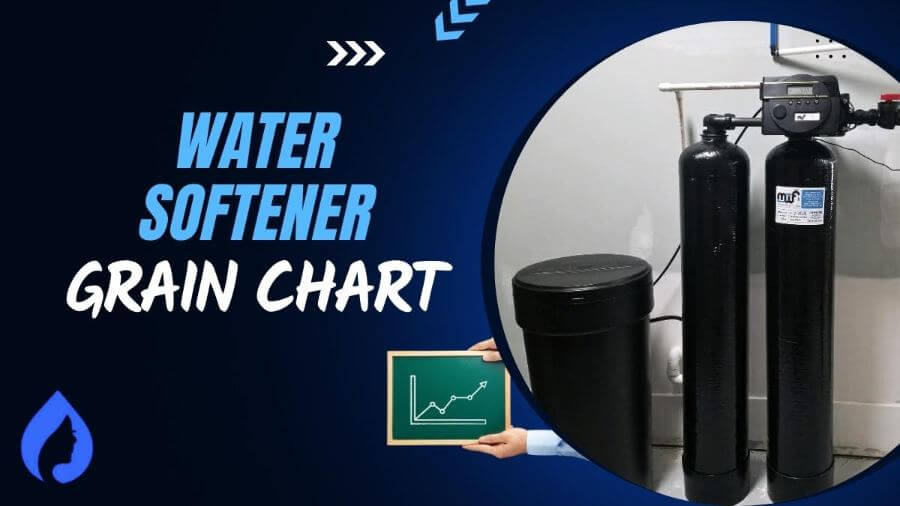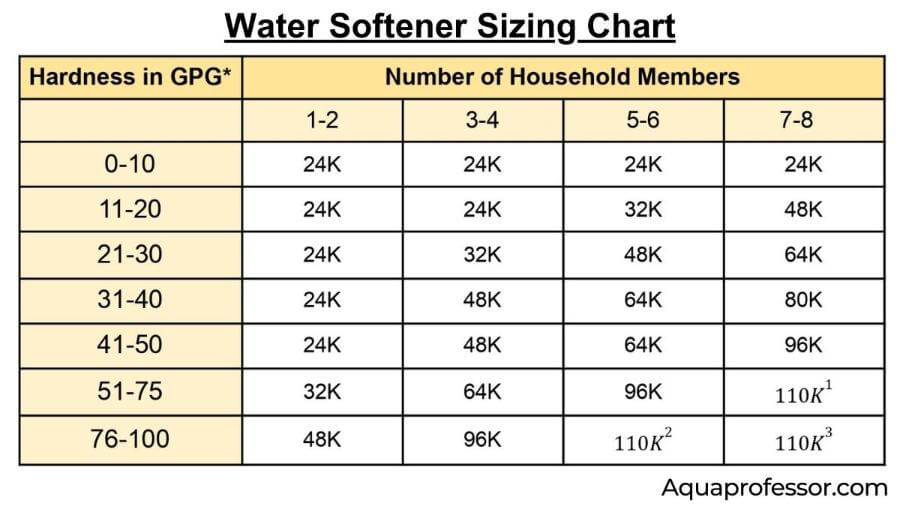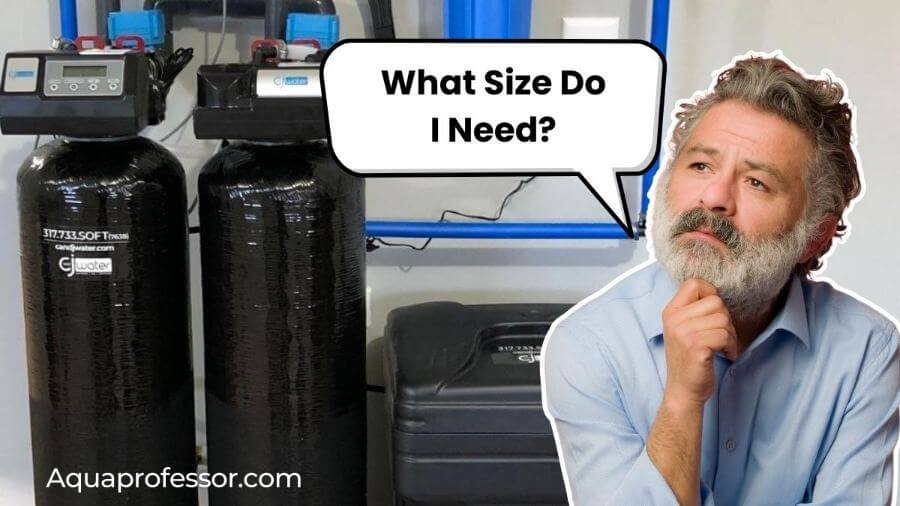
Getting a water softener isn’t enough! You need to get a proper water softener sizing based on the following:
Undersized softeners won’t give you enough soft water to drink, and oversized softeners will burn a hole in your pocket!
But worry not; we’ve made a simple water softener grain chart and softener size calculator based on all the important factors to help you get the right size water softener for your house.
🤔How Many Grain Water Softener Do I Need?
Check the water softener sizing chart below to determine the proper water softener based on your hardness (in grains per gallon) and number of people in your house:

Hardness in GPG = Hardness in PPM/17.1
It is assumed that a softener regenerates every 3 days (which is normal)
It is assumed that the average water consumption is 70 gallons/person/day as per EPA Water Sense estimates.
We’ve assumed common water softener sizes available as:
For ^123, the softener needs to REGEN quicker than 3 days, or a dual tank softener is needed as the hardness is too high.
🤨How Do I Know What Grain Water Softener I Need?

To calculate and determine the correct water softener size for your household, you may use this formula:
Water Softener Capacity Requirement = Average Daily Water Consumption x Water Hardness (grains per gallon) x 3 (REGEN frequency in days)
Let’s discuss the formula terms in a bit of detail:
Note:
To calculate how much water you use daily, you may either refer to your city water bill or multiply the number of people living in your house by 75 (Average amount of water in gallons consumed by one person as estimated by EPA).
Also Read: How To Program Water Hardness Setting
🧮Water Softener Grains Calculator
Let’s take an example to understand how to use the formula to size your softener properly:
Water Softener Capacity Requirement = Average Daily Water Consumption x Water Hardness (grains per gallon) x 3 (REGEN frequency in days)
Assuming that your drinking water has 10 GPG of hardness, household consumption per day is 225 gallons and regenerates once every 3 days.
Hence formula becomes,
Water Softener Capacity Requirement = 225 x 10 x 3 = 6,750
So, for a 6,750 grain requirement, one can go for 24,000 grain of capacity softeners, which would work sufficiently.
Also Read: Do I Need A Water Softener With City Water?
💡Water Softener Grain Chart: FAQs
What does water softener grain capacity mean?
Water softener grain capacity is the total amount of minerals that can be removed from the softener system before regeneration.
Hence, the higher the grain capacity, the higher the capacity of the water softener system to soften hard water.
What is the difference between 48,000-grain and 64,000-grain water softeners?
The one with a higher grain is more efficient in removing hard water than the one with a lower grain.
Hence, a water softener with 64000 grains can remove more hard water than a 48,000 grain softener.
However, there are other factors that affect efficiency, such as the amount of salt used.
What size water softener is for families of 2,4 and 5?
Assuming that your water hardness is 10 GPG and average water usage is 75 gallons per day, a household with 2 members needs a water softener of grain capacity of 24k to soften water properly.
Families of 4 or above need around 32k units of grain-capacity water softener to meet their daily soft water needs.
Is the higher the grain better in a water softener?
The higher the grain capacity, the higher the softening capacity of the system to soften hard water.
Hence, getting an oversized softener isn’t harmful but costs more money to purchase and has an undue impact on water pressure.
On the contrary, water treatment with an undersized unit would generate less soft water and regenerate frequently, defeating the purpose of buying a softener.
So, size your water softener appropriately using our chart, table, and calculator above.
How many grains of hardness should I set in my water softener?
According to the thumb rule, take hardness around 7-10 GPG to the water test to ensure your softener works properly according to your needs.
However, the exact formula for the hardness setting is as follows:
Hardness in GPG + (4 x iron in ppm) + (6 x manganese in ppm) + 2 GPG Buffer (considering softener age and unusual usage).
Sayan understands that access to clean water doesn’t have to be costly.
He strives to provide knowledge of water purification techniques in the simplest way possible so that we can lead a healthy life without breaking our bank.
